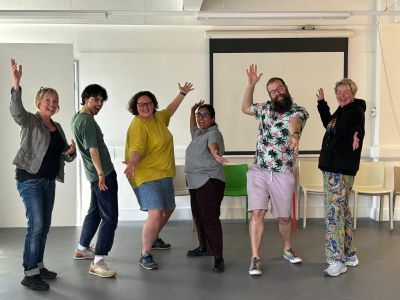Case Study: Stepping In | Camu i Mewn
Authors(s), Creator(s) and Contributors: WAHWN Ltd, Prof. Wendy Keay-Bright
Publication Date: 29/11/2024
Categories: Case Studies
Partner(s): SBUHB, PSU, HDUHB, Caerphilly Arts, Cardiff Met University
Funder(s): Arts Council Wales
Diversifying the Workforce
Introduction
Stepping In was a 6 month partnership pilot training and mentoring programme supporting 4 creative practitioners with lived experience of mental health, Deaf/disabled, global majority and low-socio economic backgrounds to gain skills, knowledge and experience working in the arts, health and well-being sector. The pilot responded to gaps and barriers for practitioners with protected characteristics, identified during consultation in 2023. The workforce is not currently representative of the communities it seeks to serve, and commissioners are working with the same trusted pool of practitioners. Stepping In offered an intensive residential, live placements, artist Q&A sessions, facilitation training, mentoring sessions, peer and full wrap around supervision and wellbeing support.
The Challenge
The arts and health practitioner workforce is not representative of the communities it seeks to serve. Commissioners are working with a limited number of trusted practitioners for projects and programmes which are not diverse in their make up. With a rapidly expanding sector and a growing number of opportunities, it is vital that commissioners increase and diversify their cohort of artist practitioners and facilitiators. Practitioners with protected characteristics experience barriers to gaining the skills and experience required to work in health settings. WAHWN responded to this challenge by creating Stepping In to support new practitioners who have faced barriers to gain skills, knowledge and experience and guide them on their journey to becoming 'commission-ready'.
The Approach
Between April - October 2024, four mentees took part in a week long training residential, hosted by Cardiff Met University with a wide range of trainers and contributors. Each was paired up with a health board or arts organisation. The programme was co-designed with the mentees to reflect gaps in their skills or knowledge and broaden their understanding of how to align their practice to health and wellbeing challenges in real time. Working safely, recognising boundaries, trauma informed, ACE Aware, Dementia awareness, and facilitation skills training were all included, as well as a series of artist Q&A sessions. Mentees also shadowed experienced artists on live placements in various hospital, community and other health settings and had opportunities to lead some workshops themselves. Mentees were paired up with mentors, receiving a minimum of four sessions each, and were supported through signposting, supervision and reflective sessions. The project evaluator held monthly online reflection sessions with the mentees to capture their experiences and feedback. Further reflections were captured during filmed interviews to create a legacy for the project, helping to tell their story of the impact and support recruitment of mentees in future iterations
The Impact
Our evaluator co-designed a bespoke approach with partners and mentees. The broad aim was to understand the effectiveness of the the Stepping In pilot project, and to identify recommendations for future programmes. The core question was: To what extent is Stepping In having a positive impact on the lack of diversity in the arts and health workforce? Impacts: The project was successful at improving mentees’ confidence as facilitators and artists. It deepened their creative practice as well as giving them practical leading skills. Mentees have been offered paid work by partners and for one "its been life changing". Both partners and mentees have shared recommendations for future iterations.
Recommendations:-
1. Secure resource to deliver Stepping In as a core part of WAHWN proramme
2.Co-create future budgets with partners and investigate other funding sources
3. Mentees to feed into the design and development of the next programme
4. Make sure each project has a health partner and an arts partner who can share responsibility for the placement
5. Create a clear framework for partner engagement, enabling clarity around roles, responsibilities and commitments for partners
Link to full evaluation report.
Lessons Learned
Involving the mentees in shaping the residential was key. We were able to design a programme which was meaningful and relevant to their needs and experience. By developing an ongoing community of practice with other UK organisations we have been able to learn about pitfalls and challenges. Monthly reflection forums with mentees held by the evaluator enabled peer support opportunities. A longer lead in time would enable clarity around roles and responsibilities and allow mentees to build relationships with partner organisations.
The Legacy
Based on the learning and impact, we are applying to UK Trusts and Foundations to build on this work supporting a wider cohort of practitioners from 2025. The Community of Practice we have developed with other UK networks and organisations will continue and allow us to share approaches, best practice and identify gaps. We will host a 'training special' in January 2025 to further explore gaps and barriers with a view to creating a range of training for arts and health practitioners.
Website and Social Media Links
School of Art, Cardiff Met University
Caerphilly County Borough Council Arts Service
Hywel Dda University Health Board
Swansea Bay University Health Board
ARRN (Artist Recovery Network) London Arts & Health
Contact Details
Angela Rogers, Executive Director, WAHWN Ltd info@wahwn.cymru
View "Stepping In | Camu i Mewn "
Tags: arts, health, wellbeing, diversity, inclusion, training, mentoring, equality, social justice, workforce, skills, supervision, reflective practice, trauma-informed, safeguarding

